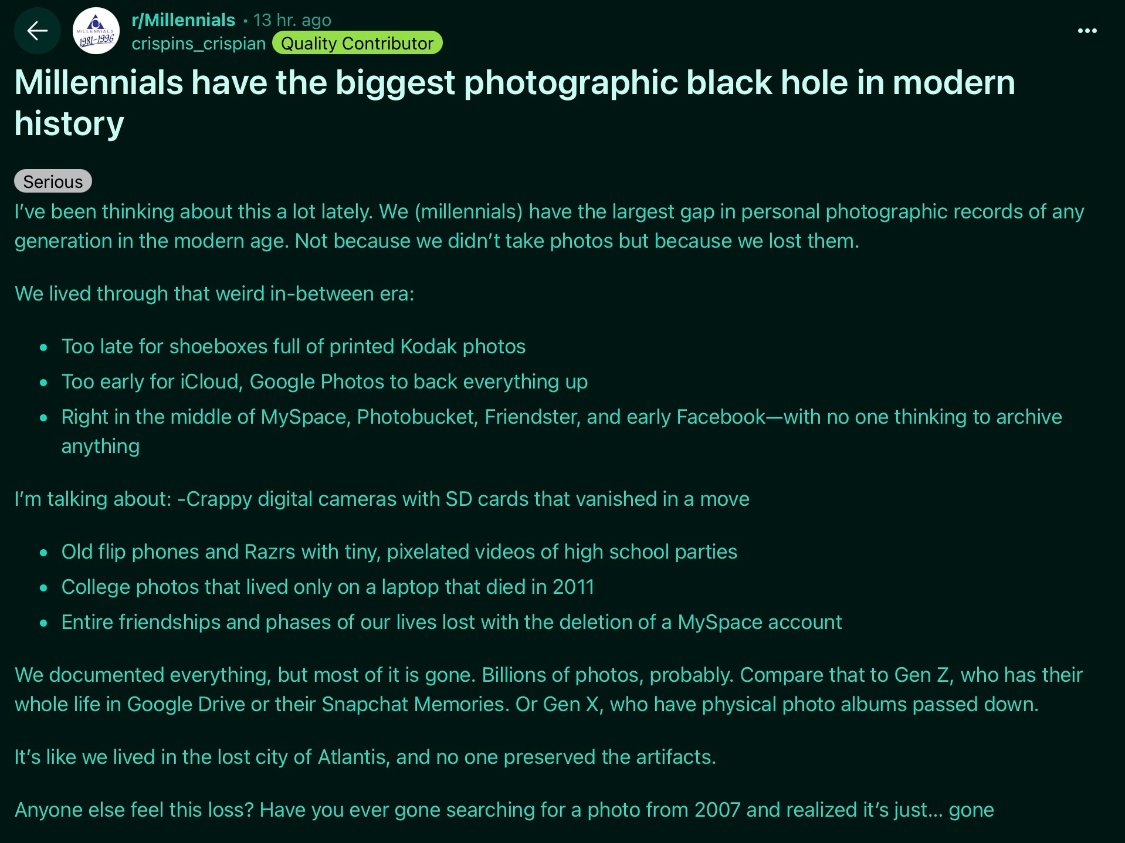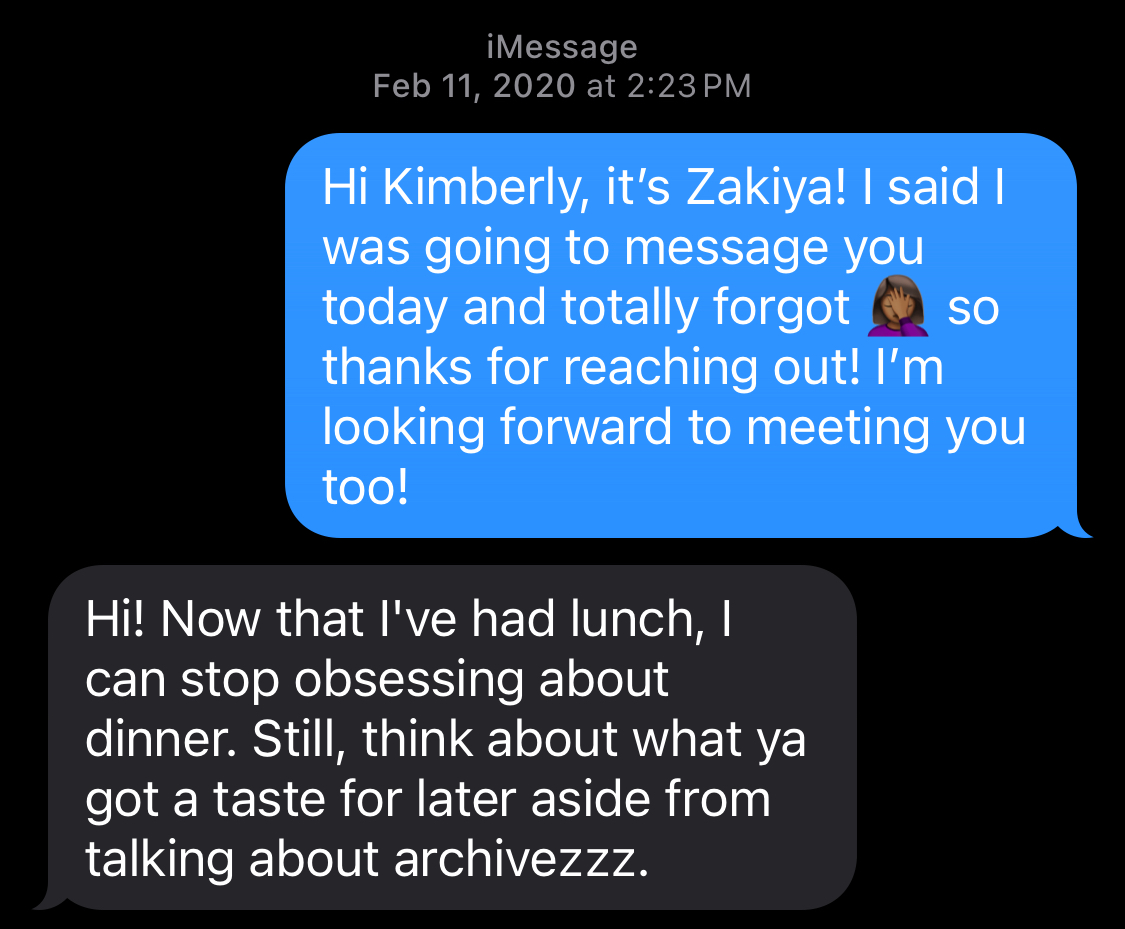memory nodes
Zakiya Collier
memory nodes
I’m proposing a pod, network, and archive exchange called “memory nodes.” The framework was born out of week 3 class discussions with Mark as we reflected on archiving our family histories and making them accessible 100 years from now. As I stepped into my professional archivist bag in our small groups, I discussed LOCKSS and 321: the need to not only have multiple copies of our files, but also keep copies of hard drives and memory-holding tools in multiple places to avoid losing everything. As climate change increases the likelihood of natural disasters even in places that are usually “safe,” it’s increasingly necessary that we have co-stewards in other geographies. Memory nodes in different area codes or whatever Ludacris said. ????
What I’m proposing is easy at the outset: y’know, shipping your hard drive to a friend or giving it to them to take back with them when they visit. But what if we want to add more to the drive? Do we only depart with full drives? Then what of the half-filled drives? Do they stay onsite and at risk? Nah, that defeats the purpose. So what if we had an actual sisterhood of the traveling hard drives where we entrusted our long-distance friends with our memories and had scheduled check-ins to ensure fixity, scheduled exchange dates where we pick up the hard drives, ship them or send them by way of another trusted individual - to make updates, reorganize, reformat, etc, and scheduled file organization days. Sounds fun, right? Like can’t you imagine having your friend pull a file for you when you’re traveling and need to reference something in your archive?
And speaking of trust, it’s at the core of memory nodes. A community archival trust? Hmm. There would be community stewardship agreements, and protocols for protecting each other’s memories, legacies, and protocols for how to ethically and carefully enter and exit the network. I have long been thinking about more ways for us to decentralize and collectively own and steward our memories outside of big cloud storage providers and outside of big institutions (if they’ll even have us). This is just one speculative iteration of that.
forensic archival detective
Digital archives use a device called Forensic Recovery of Evidence Device (FRED) developed primarily to aid law enforcement in the recovery of data and born-digital material from hard drives and media to be used as evidence. We already know law enforcement and the military drive technological development but still, yuck. FRED’s have been invaluable in the recovery and stabilization of information outside of that context so we’ll begin there. Not everyone has a FRED or the time or energy to looking for missing files and definitely can’t attempt to recover corrupted files. Beyond that, if we’re talking milennials and gen-Z, we have shit literally everywhere: google drive, browsers, dropbox, aws, facebook, IG, twitter, old blogs, old computers, hard drives, mini memory cards, regular memory cards, flash drives, camera, CDs, tapes, vhs’, on paper, and everywhere else. And the formats documenting our existences are endless: browser tabs, bookmarks, social media bookmarks, liked photos & posts, social media posts, dms, photos, comments, emails (multiple accounts). We have lots of shit and it’s everywhere.

How do we even think about pulling together the stories of our lives with the ephemera of our lives living in closed research tabs, deleted Eventbrite ticket “stubs” and flyers, and institutionally affiliated email accounts that they rapidly remove your access from? Whose responsibility will that be?? (Digital) archivists are still backlogged with physical materials from the last century (or 2). How do we even begin to tell our own stories without needing to remember 30 passwords to log in to all the platforms? You think getting an appointment at archive is hard? Try logging into an account from 15 years ago when you don’t remember that password or the email or phone number its associated with, or you don’t have that email or phone number anymore. Then what? Who’s going to do the sleuthing to get answers? Find that photo? Figure out what day that person broke your heart so you can understand how it impacted how the next 5 years of your life played out? Forensic archival detective at your service!
What does that looks like:
Storytime #1: 2 weeks ago, when I arrived at my friend’s bday party, they’re playing a game: 2 lies and truth about how you met the birthday girl. I’m immediately like damn… I don’t remember how we actually met. I can’t make up lies when I don't know the truth! The birthday girl and I start trying to figure it out and she doesn’t remember either!! We’re just in each other’s lives one day and that’s it. So while I’m hehe’ing with the party guests I’m steady scrolling up our text thread trying to figure out when and how we met. I knew I’d be scrolling for a min but doomscrolling prepared me for this moment. I’m going, I’m going. I’m cackling at our jokes, our drags—we’re funny as shit IRL. Finally, I reached the top of the thread, Feb 11, 2020. Whew… And of course, our first messages are about us planning to see each other at an event later that night. Okay so new question: What event??? So boom, I get ready to scroll Google Calendar and pray I put it into my personal calendar and not a former work account. I pause because I know the Google calendar app doesn’t go back super far. This isn’t my first rodeo. I log into Google Calendar in safari (all while meeting new people and eating deviled eggs). I make my way back to that date and see “NYU event” and it all comes back to me and birthday girl. We remember grabbing Bareburger afterward and cracking up through dinner. It was on from then! But it still doesn’t quite answer how we met because we obvs knew each other before to be texting about meeting up. But this was sufficient. We’ll use this as our earliest friendship memory for now. That took a lot of digging just for one friend/colleague and fortunately, I have all the settings on that essentially say “don’t delete shit, ever.” So many of us, don’t. And so many of us don’t care. That’s okay but for when we do want to revisit, re-remember, investigate, tell stories… what evidence will we use??

Storytime #2: This one is shorter. This past week, my friend and I are co-working on Facetime and we somehow start talking about our hs proms 12-15 years and the dresses we wore. We discover that we both when the nontraditional route with short sweetheart neckline tulled dresses and we immediately go searching for my photos. I know mine are in a private Facebook album, so I log in and pull up some photos (they’ve been downloaded from Facebook and preserved as well but it was more accessible). She looks to Dropbox first because she knows her brother sent them to her there and then on a hard drive. No prom photos. We start talking through her archival processes and where she must have saved them because she KNOWS she has them. She’s getting frustrated, I yearn to be able to help but I’m not there and I don’t know enough about how she saves things to help! She ended up texting me later that night with a screenshot of the photo. Her brother, who is a photographer, has always saved all of his files and backed them up. So thankfully, he had saved a folder when they shared the same computer in our household. He saved all of her files from high school from 2005 to 2009 including music downloads and photographs he’s taken at family events, graduation, etc. She immediately sent him a Dropbox link for him to share the TIFFs and JPEGs.
I have one more story but ask me about that one! I tell these stories to encourage us to think about how we search memory, how we save our memories, and where they are held. Meta doesn’t care about preserving your memories. Preservation is not their mission or motive so it has to be ours. We have to be our own archivists and detectives, but not just when prompted to figure something out. The digital world that we grew up in has never thought about the mess it would create for our archives when platforms appear and disappear, technological affordances work and then don’t, accounts are functioning and then banned without notice. We also haven’t had the time to think about how every thing we interact with is a part of our documentation and a legacy. We have a right to be forgotten and a right to forget, but what if we just closed the tabs to make space and make sure our computer doesn’t blow up. We didn’t have time to think about how that article we read informed and shaped our thinking and we might want another chance to look at it, show our descendants, include it in our artists files, etc. Now we don’t remember the name or it no longer exists and it wasn’t web archived.
staring here and now, we (including me) have to be more active in our memory processes. We are each other’s nodes, we are co-stewards. Let’s sleuth, preserve, and build together.
I couldn’t let someone’s memory of this mixed CD be lost. The dispossession of memory (in all its interpretations) is real. The only way to remember is together.

about the author:
Zakiya Collier is an Afro-Carolinian archivist, memory worker, and educator whose work and research explore archival practices that account for the material conditions of Black life and the role of cooperative thought in the sustainability of cultural memory. Follow my work & play here:
IG: @ZZcollier